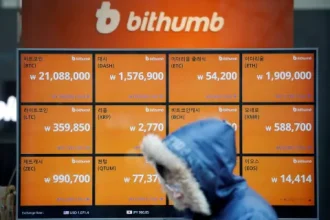Brazil’s Finance Ministry is considering extending the country’s financial transaction tax — the IOF — to cross-border payments made with cryptocurrencies, especially stablecoins, according to an exclusive Reuters report.
Okay news gathered that under Brazil’s current “Virtual Assets Act” (Law 14,478/2022), crypto trades are not subject to IOF, although investors already pay income tax on profits above the monthly exemption threshold. Officials now say the tax change would help close regulatory gaps and potentially raise significant public revenue as Brazil works to meet fiscal targets.
Why Stablecoins Are the Focus
Stablecoins like USDT dominate Brazil’s crypto market. In the first half of 2025, crypto transactions in Brazil reached R$227 billion (about $42.8 billion) — a 20% increase from the same period in 2024.
Two-thirds of that volume involved USDT, while Bitcoin accounted for only 11%.
Authorities believe stablecoins are being used primarily for payments, not investment, which, combined with light regulation, creates opportunities for money laundering and tax evasion.
A new central bank framework that took effect in February already classifies stablecoin transactions as foreign-exchange (FX) operations, placing them in the same category as international payments, card settlements, electronic transfers, and movements to or from self-custody wallets.
“The new measures prevent regulatory arbitrage and ensure stablecoins face the same oversight as traditional FX,” a government official told Reuters.
Expanded Reporting Rules
Brazil recently updated its reporting requirements to include foreign crypto service providers operating in the country.
Federal Police officials say clearer visibility into these flows will make it easier to enforce customs and import-related taxes.
Authorities estimate Brazil may be losing over $30 billion a year to imports settled through crypto to avoid taxes — far more than what IOF would cover.
Recent Tax Changes Hit Investors
Earlier this year, Brazil scrapped tax exemptions for small crypto gains, replacing them with a flat 17.5% tax rate on profits (MP 1303).
Previously, individuals could sell up to R$35,000 ($6,300) in crypto per month tax-free.
The new system means small investors may pay more, large holders may pay less, losses can only be offset within five rolling quarters, and stricter rules begin in 2026.
Brazil Remains LATAM’s Crypto Powerhouse
Brazil is Latin America’s biggest crypto market and ranks 5th globally on the 2025 Chainalysis Crypto Adoption Index — up from 10th in 2024.
Between July 2024 and June 2025, Brazil received $318.8 billion in crypto flows, representing nearly one-third of all activity in the region.
The central bank recently introduced new licensing requirements for local digital-asset companies, including intermediaries, custodians, and brokers.







